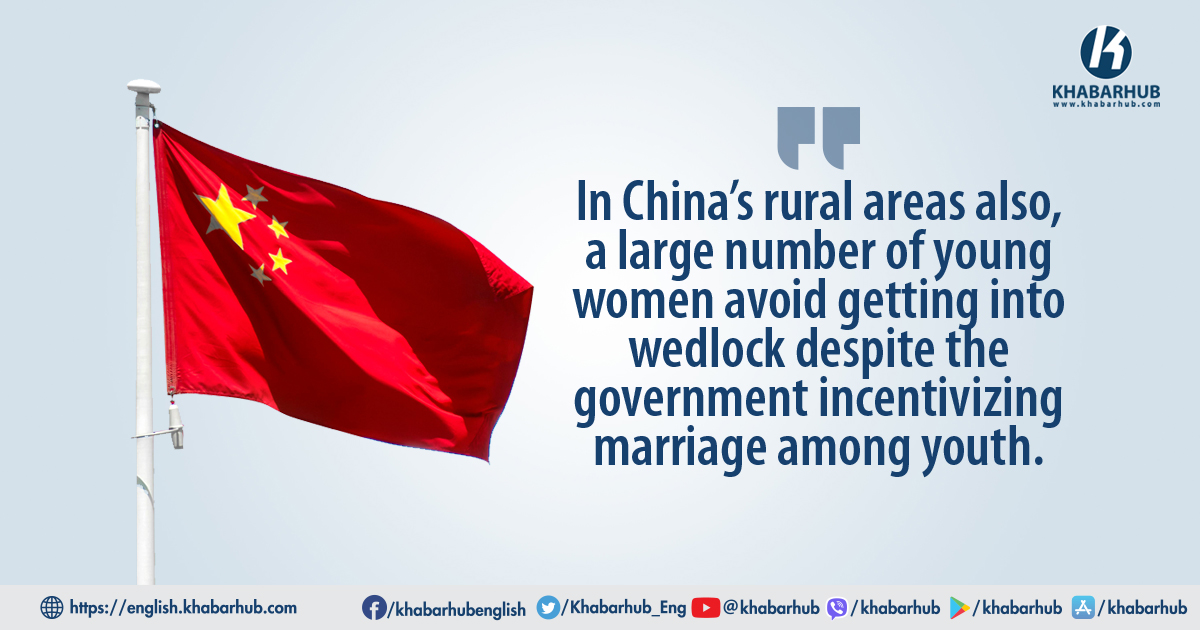0%

With gender imbalance becoming most glaring in China and number of unmarried men rising, local governments in several provinces have undertaken a unique approach to find solutions to the problem as they offer cash rewards and other incentives to matchmakers if they help in successfully getting unmarried men marry women in the country which is grappling with declining birth rate.
Local governments in some Chinese provinces like Shaanxi and Guangdong have announced offering rewards from 600 to 1,000 yuan (US$84 to US$140) to those who broker a marriage between woman and man aged between 30 and 45, The Paper, a Chinese news site said.
As per China’s 2020 census, the country has 722 million men and 690 million women, with gender imbalance most noticeable among those born during 1979-2015, the period when one-child norm was in force in the world’s second economic power.
In 2021, the gender ratio, as per the National Bureau of Statistics (NBS), in rural areas was about 108 men for every 100 women. In all, there are today more than 30 million men in China who are destined to die single.
Several provinces in the country have announced a cash reward of 1,000 yuan (US$138) to newlyweds if the bride is aged 25 or younger.
However, on account of the glaring gender gap, policy makers fear this could affect social stability and economic development of the country.
Although this gap is not easy to fill, matchmakers’ role to find a bride for an eligible bachelor is seen as the need of the hour.
The problem of gender imbalance is prevalent across China.
Yet, it is more pronounced in rural areas where the preference for boys over girls is more deeply ingrained.
Giving a peep into the rising number of unmarried men in village areas, The Paper presented an example of Xiangjiazhuang village in Shaanxi province.
The village is a home to 270 households and more than 40 men between the age of 25 and 40 are unmarried, the Chinese news portal said.
In China, preference for sons in the country stretches back for centuries. “Infanticide, the abandonment of girl babies and favourable treatment of boys in terms of food and health has long produced a surplus of men,” The Guardian said in a report.
China’s one-child policy is held responsible for this societal problem. In the early 1980s, there were 108 males for 100 females.
By 2000, this imbalance soared to 120 males, and in some provinces, such as Anhui, Jiangxi, and Shaanxi, to more than 130, The Guardian said.
Some analysts link the rise in unmarried men in China to the high rate of unemployment among youth.
As young men with no job find it hard to support their families, they prefer to remain single, South China Morning Post said.
The unemployment rate for young people aged 16 to 24 in China stood at 14.9% in December 2023, according to monthly data from China’s National Bureau of Statistics.
High cost of living is also impacting youth and their attitude towards life.
In cities like Beijing, Shanghai, Guangzhou, and Chengdu where cost of living is very high, an increasing number of well-educated and high salaried youth prefer to stay alone, abhorring marriages and having kids.
This inclination is particularly very high among youth of ages between 20 and 30, the Hong Kong-based English newspaper said.
But it is not just male, even women in urban areas of China prefer to stay single.
A survey of 2,905 unwed urban people aged 18-26 by the Communist Youth League in October 2021 found that 43.9% of women had no intention of getting married or were unsure if it would happen, while 24.6% of male wished to remain single.
China’s population fell for a second consecutive year in 2023, as a record low birth rate and a wave of COVID-19 deaths when strict lockdowns ended accelerated a downturn that will have profound long-term effects on the economy’s growth potential, Reuters said.
In China’s rural areas also, a large number of young women avoid getting into wedlock despite the government incentivising marriage among youth.
Several provinces in the country have announced a cash reward of 1,000 yuan (US$138) to newlyweds if the bride is aged 25 or younger.
Also, President Xi Jinping last year gave a speech on the need to “cultivate a new culture of marriage and childbearing.”
But since the country is facing a huge gender imbalance with more than 30 million men living an unmarried life as they are not able to find wives for themselves, it is becoming very difficult for Chinese authorities to fix the problem of declining birth rate.
China’s population fell for a second consecutive year in 2023, as a record low birth rate and a wave of COVID-19 deaths when strict lockdowns ended accelerated a downturn that will have profound long-term effects on the economy’s growth potential, Reuters said.
The NBS said the total number of people in China declined by 2.08 million, or 0.15%, to 1.409 billion in 2023.